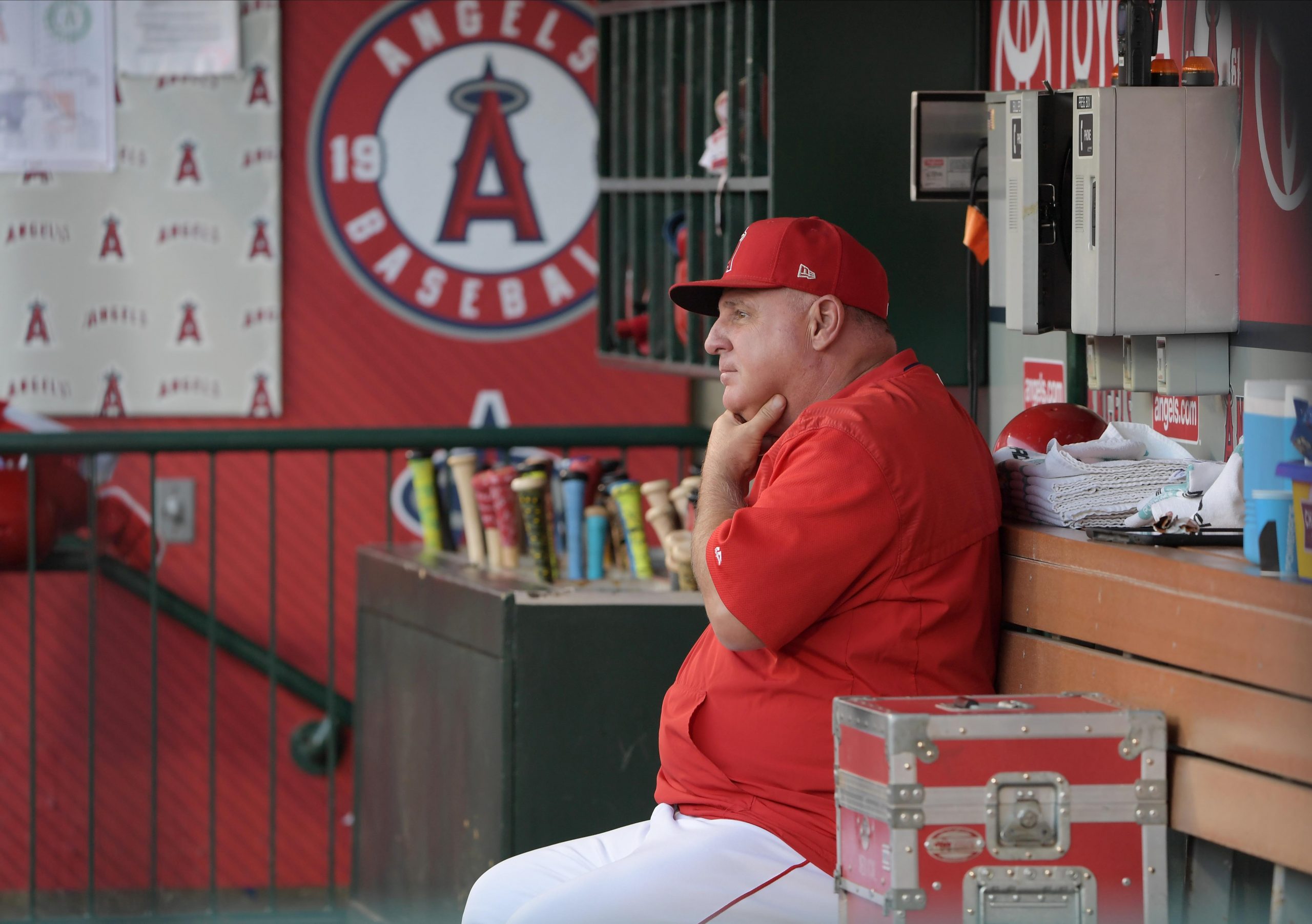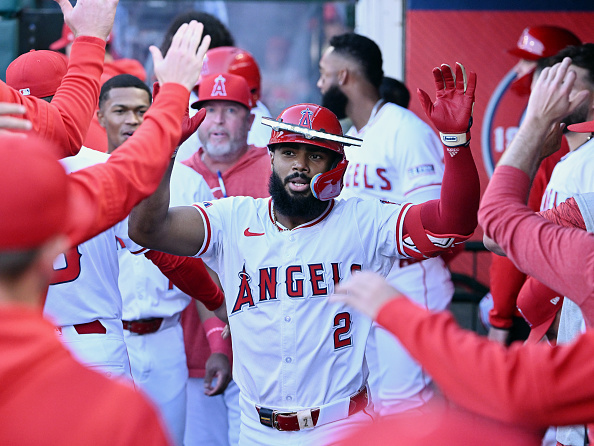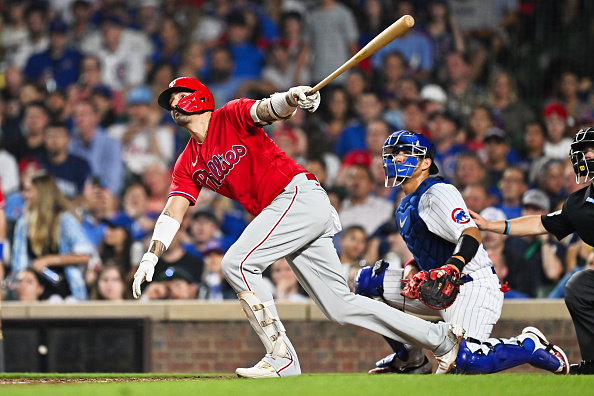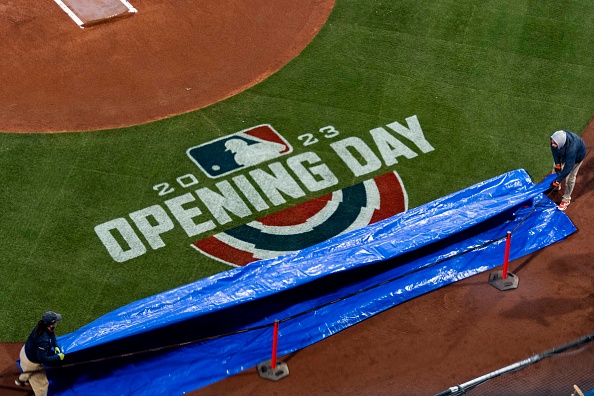As Los Angeles Angels baseball fans await the hopeful start of their franchise’s 60th MLB season, Prime Time Sports Talk is going to go back and compile all-decade teams from the first six decades in club history. The first decade of the new millennium brought social media, and Angels fans their first-ever World Series championship. Here’s B..J Martin’s All-Decade team for the first decade of the 21st century.
First Base – Darin Erstad
While Erstad played a considerable amount of time during the decade in left field and center field, he still played a considerable amount at first during his time with the club from 2000-06. Erstad won a Gold Glove at first base in 2004 and hit .289/.342/.406 for the decade, including his 2000 season in which he led the American League in hits (240) while hitting .355.
Scott Spiezio cannot be ignored on this list as his role in the Angels championship season was critical to them reaching the title but Erstad gets the edge based on his seven seasons of performance.
Second Base – Adam Kennedy
Adam Kennedy opened the decade as the Angels starting second baseman and his three-home run game in the 2002 ALCS against Minnesota was one of the greatest single-game performances in franchise history. Kennedy played solid defense, provided a clutch bat, and was a consistent producer in the Angels lineup during his seven-season tenure in Anaheim. Kennedy was a .308/.317/.526 hitter in 85 plate appearances across five postseason series with the Angels.
Shortstop – David Eckstein
Orlando Cabrera was phenomenal during his three seasons with the Angels, winning a Gold Glove and stealing 20 or more bases all three years with the club. However, it was the “Ecks factor” that was front and center during the Angels run to their first-ever World Series title in 2002.
Eckstein jumped into the Angels shortstop position as a rookie in 2001 hitting .285 with 29 stolen bases and finishing fourth in AL Rookie of the Year voting. The next season, Eckstein would be a catalyst on their championship club and would remain the club’s lead-off hitter in all four of his seasons in the Angels lineup.
Third Base – Troy Glaus
Glaus was a three-time All-Star at the position for the Angels during the decade and a Silver Slugger winner in 2000 and 2001, including a season with a league-leading and American League-record 47 home runs by a third baseman in 2000. Glaus would club seven home runs for the Angels during the 2002 postseason which included his World Series MVP performance where he hit .385 with three home runs and eight runs.
Left Field – Garret Anderson
Anderson continued to hold the left-field position for the majority of his second decade with the Halos. Anderson’s power increased as he came into the new century, slugging 200 home runs and driving in 899 runs for the Angels before leaving the Halos in 2009. Anderson was a two-time Silver Slugger winner and three-time All-Star for the Angels during the decade and won the All-Star Home Run Derby representing the club in 2003.
Center Field – Torii Hunter
After 11 seasons in Minnesota, Hunter joined the Angels in 2008 and his impact was instantly valuable to the club playing into two postseasons with the Halos. Hunter would win Gold Glove awards to finish the decade as the club’s starting centerfielder including his 2009 All-Star season where he hit .299 with 22 home runs and 90 runs batted in. Hunter’s clubhouse leadership was instrumental to the young players coming into the Angels late in the decade and that would continue to carry value for the club heading into the future.
Right Field – Vladimir Guerrero
The Angels surprised the baseball world when they signed prized-free agent Vlad Guerrero before the 2004 season. The future Hall of Fame outfielder did not disappoint hitting .337, 39 home runs, and 126 runs batted in becoming the Angels second-ever American League Most Valuable Player. Guerrero was an All-Star and would finish top-10 in MVP voting in his first four seasons with the Angels. “Vlad” would finish his MLB career in Anaheim .319/.381/.546 with 173 home runs and 616 runs batted in before heading to Texas in 2010.
Catcher – Bengie Molina
Bengie Molina was one of the best defensive catchers during the decade winning two Gold Gloves, but his clutch performance at the plate was under-estimated by many. Molina would hit .274/.309/.399 during the decade with the club but his .444, three home run, five-RBI performance against the Yankees in the 2005 ALDS was a great example of his clutch performance.
Mike Napoli was a huge impact for the Angels at the catcher position after Molina’s departure in 2006 but Molina’s defensive advantage earns him the catcher spot on this roster.
Designated Hitter – Tim Salmon
Salmon’s rash of injuries would force the right fielder to spend most of his final seasons with the club as the everyday designated hitter for the club. After a decade of playing for non-playoff clubs, Salmon did not disappoint when finally leading his club to the 2002 World Series title hitting .346, two home runs, and five runs batted in. Salmon would spend his entire career playing for the Angels and would finish the decade hitting .269 with 103 home runs.
Utility Player – Chone Figgins
Chone Figgins emerged as a valuable pinch-runner for the Angels during their 2002 World Series championship run and would find himself a super-utility player his first few years for the Angels before settling into the third base position in 2007. Figgins would take over for Eckstein as the club’s everyday lead-off hitter hitting .291 with 280 stolen bases for the decade with the club. Figgins would be named to the 2009 All-Star team and steal 30 or more bases for six straight seasons with the Halos.
Starting Pitcher – John Lackey, Jered Weaver, Jarrod Washburn, Ervin Santana, Bartolo Colon
John Lackey joined the Angels starting rotation late June 2002 and four months later would find himself starting Game 7 of the World Series. The 6-foot-6 righty would be the ace of the Halos’ staff for most of the decade finishing his Angels career after the 2009 season 102-71 with 3.81 ERA in 233 starts with the franchise. Lackey would go on to win two more World Series championships for the Red Sox and Cubs.
Jered Weaver would break into the Halos rotation early in 2006 season and finish his rookie season with 11-2 record and 2.56 ERA in his first 19 MLB starts. The Dream Weaver would finish the decade 51-27 with 3.73 ERA across his first 110 big-league appearances with the Angels. Weaver would take a major leadership role in the clubhouse following the sudden passing of Nick Adenhart early in the 2009 season that would set the tone for success in the decade to come.
Jarrod Washburn established himself as a full-time starter in the Angels rotation in his fourth MLB season in 2001 finishing the year 11-10 in 30 starts. Washburn would break out the following season, completing the 2002 regular season 18-6 with 3.15 ERA and finishing fourth in Cy Young balloting before starting five postseason games leading to World Series title. Washburn would compile 65 victories for the Angels during the decade before leaving for Seattle as a free agent following the 2005 season.
After being signed as a teenager and rising through the Angels farm system, Ervin Santana debuted for the Angels early in 2005 and would finish his rookie campaign 12-8 and follow-up with 16-8 sophomore season. By 2008, Santana would be an All-Star, finishing the year 16-7 with 3.49 ERA and 214 strikeouts and sixth in AL Cy Young voting. Santana’s 59-45 record in the decade would be the third most victories of any Halos pitcher for the period.
Bartolo Colon and Kelvim Escobar would both join the Angels in 2004 as free agent starting pitchers. Both pitched extremely well for the club between injuries and down years. I’m giving the edge to Colon on this roster simply for the 18- and 21-victory seasons of 2004 and 2005, the latter earning Colon the American League Cy Young award. In addition to Escobar, a good argument for Joe Saunders could be made for a spot in the all-decade starting rotation for the Angels.
Relief Pitchers – Francisco Rodriguez and Scot Shields
It was very difficult to leave a closer that saved 177 games in the decade and was on the mound for the club’s final out of their first World Series championship, but only naming two relievers meant giving the edge to Francisco Rodriguez and Scot Shields over Troy Percival.
Percival was the Angels’ closer of the 1990s and came into the 2000s in that role before handing the role over the “K-Rod.” Rodriguez would save 208 games for the club including an MLB-record 62 saves in 2008. Rodriguez’s performance in the 2002 playoffs put him on the map and he would be named to three All-Star teams and finish in the top-five in Cy Young voting three different seasons with the Angels.
Scot Shields was the Angels rubber-armed set-up man from 2002 to 2010, pitching in 491 games for the Halos including 15 starts. Shields would pitch 60 or more games five straight seasons including 17 postseason appearances in which he held a 3.20 ERA during his decade with the club. The decade was so strong with relievers that Troy Percival and Brendon Donnelly would easily breakthrough most other decades’ rosters.
Manager – Mike Scioscia
Who else? He managed the Angels the entire decade to a 900-720 record, five AL West division titles, six post-seasons, and one World Series championship. Scioscia guided the Angels through their most successful decade in franchise history to date.
See additional Angels All-Decade rosters: 1960s, 1970s, 1980s, 1990s







